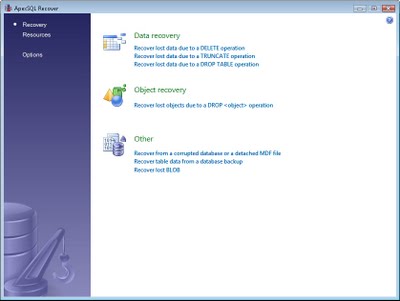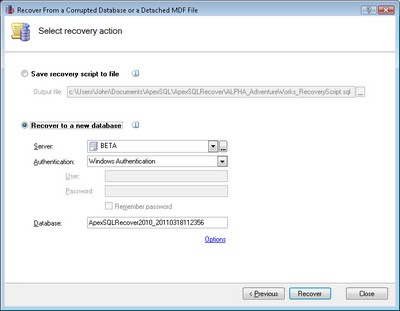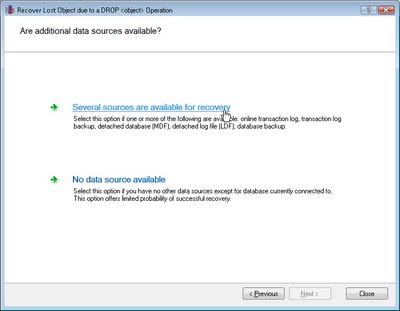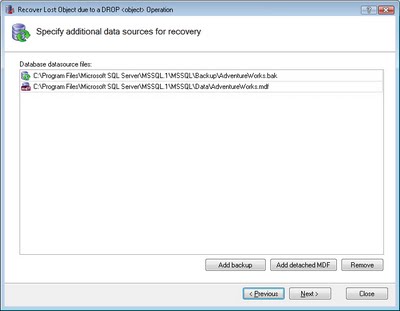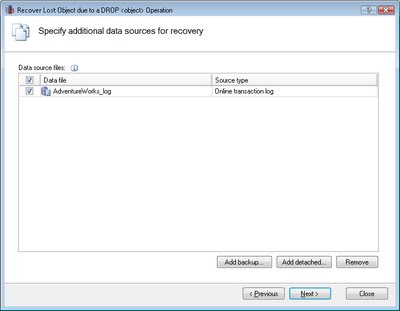ApexSQL, a Microsoft Gold Certified Partner and leading provider of Microsoft SQL Server solutions is proud to announce ApexSQL Recover 2011. This new version allows you to recover directly to a database as well as to recover database objects from several new data sources and brings improved performance, a completely new interface and much more. The upgrade will be a free upgrade for existing customers of ApexSQL Recover with active Subscription
Here’s a preview of what’s coming in the new release:
- Direct-to-Database recovery
- Recovery of system objects from detached data files
- Recovery of system objects from backups
- Recovery of dropped system objects from transaction logs
- Support for SQL Server Denali CTP1
- Improved interface
Other improvements:
- Improved support for SQL 2005 SP1, SQL 2008 and SQL 2008 R2
- Improved scalability when reading from very large transaction log files
Let’s take a quick look at these cool new features:
Redesigned interface for improved usability
The new, improved interface will help you to quickly specify the appropriate recovery option.
New recovery option: Direct-to-Database recovery
Direct-to-Database recovery allows you to directly recover data from a recovery source (transaction logs, online database files, damaged data files, backups and so on) into a new database on a server of your choice. Since there is no need to create those pesky multi-gigabyte SQL scripts storage space requirements have been significantly lowered and the performance of the recovery has been improved. To avoid any data loss, a new database is created for each new recovery run. All errors that might happen during the recovery are stored in the newly created database thus allowing you to review them at your leisure.
New recovery option: Recover SQL objects from detached data files
In previous ApexSQL Recover versions the recovery of data from detached (usually damaged) data files has been limited to of user table schemas with row data. Now, you can now recover other database objects like stored procedures, functions, views, indexes and so on.
New recovery option: Recover SQL objects from backups
Similar to recovery from detached data files, previous versions of ApexSQL Recover were limited to recovery of user table schemas with row data. This limitation has now been removed and you can now recover other database objects like stored procedures, functions, views, indexes and so on.
New recovery option: Recover dropped SQL objects from transaction logs
Previously, ApexSQL Recover’s support for dropped database objects like stored procedures, views, functions and so on was limited to SQL Server 2000. The support for recovery of these objects has now been improved and expanded to SQL Server 2005, SQL Server 2008 and SQL Server Denali CTP1.
Support for SQL Server Denali CTP1
ApexSQL Recover will fully support all recovery options SQL Server Denali CTP1
Improved support for SQL 2005 SP1, SQL 2008 and SQL 2008 R2
ApexSQL Recover will fully support the recovery of the following types of rows:
- Rows from tables with row compression enabled (tables with DATA_COMPRESSION option set to ROW)
- Rows from tables with page compression enabled (tables with DATA_COMPRESSION option set to PAGE)
- Rows with seamless UNICODE compression in NCHAR and NVARCHAR (except MAX) fields. Seamless UNICODE compression was introduced in SQL Server 2008 R2.
- Rows from tables with sparse columns.
- Rows from tables with enabled vardecimal storage format
Improved scalability when reading from very large transaction log files
ApexSQL Recover will support recovery of deleted data and dropped objects from very large transaction log files.
About ApexSQL Recover
ApexSQL Recover is a recovery tool that can retrieve data deleted in SQL Server. Restore data lost due to delete, truncate and drop operations. Recover BLOB data as files and extract data from corrupted databases, detached MDFs or SQL database backup. Recover from all SQL 2012, SQL 2008 R2, SQL 2008, SQL 2005, and SQL 2000 databases.
May 30, 2011



